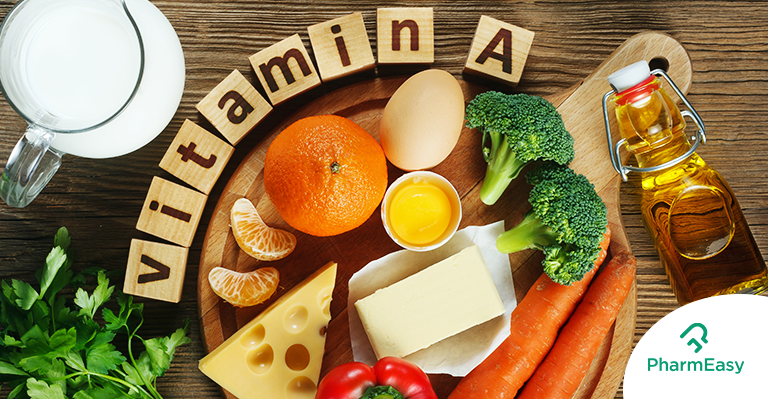Vitamin A: Importance, Symptoms, Prevention & Treatment
By Dr. Nikita Toshi +2 more

Get,

to manage your symptom
Get your,


4 Cr+ families
benefitted

OTP sent to 9988776655



You’ve successfully subscribed to receive
doctor-approved tips on
Whatsapp

Get ready to feel your best.

Hi There,
Download the PharmEasy App now!!


Register to Avail the Offer
Send OTPBy continuing, you agree with our Privacy Policy and Terms and Conditions

Hi There,
Sign up on PharmEasy now!!
Trusted by 4 crore+ families

OTP sent to 9988776655



You have unlocked 25% off on medicines




Code: NU25
By Dr. Nikita Toshi +2 more
Table of Contents
Much as we take care of our diets and health, certain issues do crop up. Partly this is due to environmental factors like loss of nutrients in food due to longer distances, overcooking, etc. and partly it is because we do not add a wide variety of food items to our diets. If we are particularly fussy, there are bound to being deficiencies in the body. One such condition is a deficiency of Vitamin A. Developed countries rarely face the challenges of rampant Vitamin A deficiency; it is only the poorer nations of the world that suffer from it.
When the diet does not contain proper doses of vitamin A, it creates a deficiency. It is a condition mostly affecting children. Many kids develop this after a bout of measles. Vitamin A is fat-soluble and is made up of components known as ‘Retinoid’. There are three forms of this vitamin- retinol, beta-carotene and carotenoids.

Retinol is the most accessible form and can be obtained from animal sources. The pigment responsible for adjusting to low light does not get manufactured in the body in the face of Vitamin A deficiency. This is why people start suffering from night blindness. Vitamin A is vital for vision, bone health, immune response, reproduction, skin and hair health and to maintain good health of respiratory, urinary and digestive systems. It helps in proper foetal growth and is essential for genetic expression.
Dry hair, dry and rough skin, brittle nails, night blindness and low resistance to infections are some of the most common symptoms of Vitamin A deficiency. Since it is a fat-soluble vitamin, diseases like cystic fibrosis, inflammatory bowel syndrome and other gastric issues affect its absorption in the body. Alcoholism also leads to low absorption of this vitamin.
The deficiency of this vitamin must not be taken lightly as it can lead to partial or complete blindness if not treated in time. Children who had good levels of this vitamin in their blood either fought off measles completely or recovered in a lesser duration than those who were lacking this vitamin.
Severe vitamin A deficiency may lead to permanent vision loss or blindness especially in children. In India Vitamin A is given at government hospitals for free till 5 years of age in children.
Dr. M.G. Kartheeka, MBBS, MD(Pediatrics)
Vitamin A is not only important for normal vision but it is also implicated in maintaining a normal immune system, healthy skin, bone growth and maintenance of vital organs in the body.
Dr. Ashish Bajaj, M.B.B.S., M.D. in Clinical Pharmacology and Toxicology
Vitamin A is a fat-soluble vitamin that plays a major role in maintaining body growth, vision, immune function and a healthy reproductive system. A general amount of Vitamin A in your everyday diet prevents the symptoms of its deficiency, which may cause excessive hair loss, night blindness, dry eyes and several skin problems. The recommended dietary allowance (RDA) of Vitamin A daily is 900 mcg for men, 700 mcg for women and 300-600 mcg for children.
Foods high in Vitamin A1: Vitamin A1, also known as retinol, is only found in abundance in animal-sourced products, like fatty fish, liver, butter and cheese. Some of the food items that are rich in Vitamin A1 are as follows:
The human body is capable of producing Vitamin A from carotenoids found in plants. These carotenoids, including beta and alpha carotenoids, are collectively known as provitamin A. Vegetables rich in provitamins are as follows:
Disclaimer: The information provided here is for educational/awareness purposes only and is not intended to be a substitute for medical treatment by a healthcare professional and should not be relied upon to diagnose or treat any medical condition. The reader should consult a registered medical practitioner to determine the appropriateness of the information and before consuming any medication. PharmEasy does not provide any guarantee or warranty (express or implied) regarding the accuracy, adequacy, completeness, legality, reliability or usefulness of the information; and disclaims any liability arising thereof.
Links and product recommendations in the information provided here are advertisements of third-party products available on the website. PharmEasy does not make any representation on the accuracy or suitability of such products/services. Advertisements do not influence the editorial decisions or content. The information in this blog is subject to change without notice. The authors and administrators reserve the right to modify, add, or remove content without notification. It is your responsibility to review this disclaimer regularly for any changes.

Leave your comment...
Comments